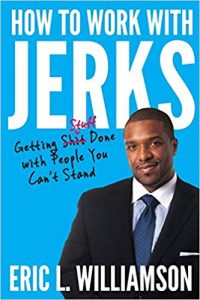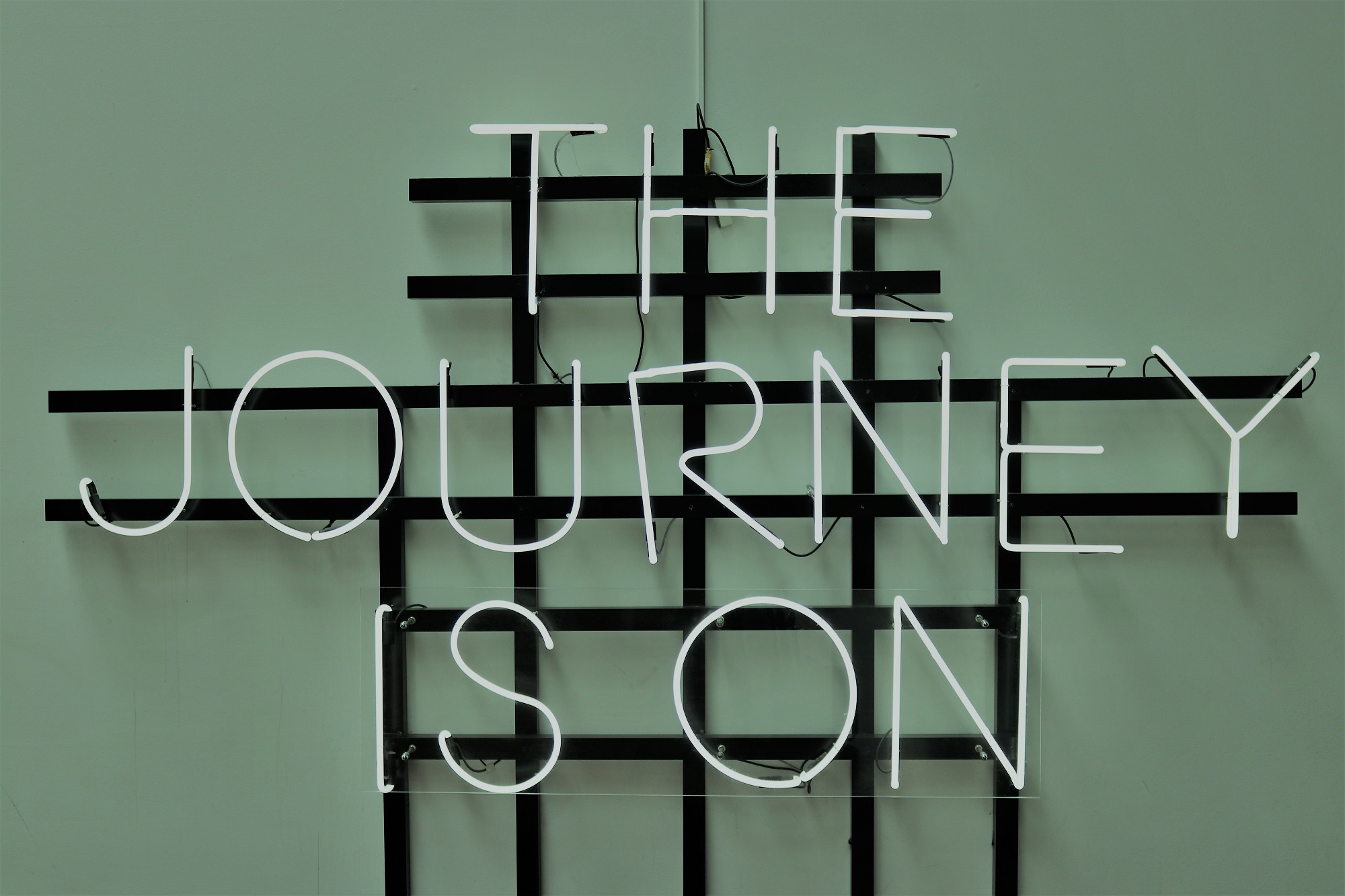Eric Williamson is a nationally recognized keynote speaker, workshop trainer, and author of the book, “How to Work with Jerks: Getting stuff done with people you can’t stand.” He’s also a consultant focused on helping organizations strengthen relationships with colleagues and clients by creating an atmosphere where employees are engaged, valued, and developed into leaders.
Eric shares the backdrop of why he decided to write the book and how you too get stuff done working with people you can’t stand.
Listen to the Episode Here:
Podcast: Play in new window | Download | Embed
Subscribe: Apple Podcasts | Email | TuneIn | RSS | More
I have a special guest. I want you to welcome Eric Williamson to the show. He is a nationally recognized keynote speaker, workshop trainer and he is the author of the book, How to Work with Jerks: Getting Stuff Done with People You Can’t Stand. I am excited to speak with him. Eric is also a consulting go-getter. He specifically focuses on helping organizations strengthen relationships with their colleagues and clients by creating an atmosphere where people are engaged, valued, and they are able to bring their best self to work. I’m thrilled to be having this conversation with Eric. As consultants, we spend 99.9% of our time working with all types of different people, whether it’s clients, it’s team members, it’s leadership, it’s vendors. You’re going to get a lot from this show in speaking with Eric. I want you to check his book out. Part of being a great consultant is also being able to influence and that sometimes means working with people that are a little difficult. Eric is going to drop some nuggets that you all will find extremely useful.
Interview with Eric Williamson
Eric, welcome to the show. How are you doing?
Thanks for having me, Christie. I’m doing wonderfully.
The name of your book was amazing. I was like, “I have to get him on my show. There’s no question my audience needs to hear the tips and gems you’re dropping with this book.” Maybe we can take a step back. I’d love for you to introduce yourself to the go-getters of the show.

My name is Eric Williamson. I am the author of the book How to Work with Jerks. I’m an expert consultant. I’ve worked with organizations, large and small, to build relationships and strengthen them to create a positive culture and environment where employees and staff are engaged, valued and developed into leaders. I’ve been doing that for the past many years. I have a passion to see people succeed and help other people. I’m also a family man. I’ve got two kids. I’ve got a three-week-old son named Jackson and a two-year-old daughter named Sophia. That’s been one great balancing act, as you can tell little or no sleep if any. I’ve been going but I’ve loved every moment of it.
Congratulations on your baby son. I was talking to you and I know you’re not getting a lot of sleep these days.
Sleep is at a premium. I had some practice with my two-year-old daughter who’s a big fireball. She’s got tons of energy. As soon as she was born, she was keeping us all on our toes. I can’t recall the last time I reclined on my couch. Our whole living room was turned upside down with toys and play pins and all this other stuff. You’ll see a stack of my books ready to get shipped out for people who are purchasing signed copies as one whole crazy mess but it’s a beautiful mess. Sometimes I find a way to steal 20 to 30 minutes of a catnap here or there and that recharges me before I go to my next event or next meeting. It’s all good.
Eric mentioned the name of his book. I’m going to say the full name because I don’t think you did it justice. It’s called How to Work with Jerks: Getting Stuff Done with People You Can’t Stand. That title alone is a million-dollar title.
It took me a while to come up with that title.
It’s a winner, Eric, and I’m excited for you. Congrats on publishing. You do a lot of work with various different organizations as a consultant. How did you decide to go into consulting? How did you get started in the line of work that you do?
I started out as a leader in the public sector and I did that for about several years. I don’t know if you’re familiar with the public sector, but there are a lot of red tapes and a lot of organizational culture issues whether you’re talking about the state, local or even the federal. I won’t reveal the name of the organization that I worked with, but I noticed that I had a knack for leading others. I would turn around teams that were not motivated at all and not producing at all. I would come in and provide a fresh perspective on things and inspire them and help them achieve the things that they needed to do. Having worked with colleagues and worked with people of all types, I started thinking, “There are a lot of other people that would appreciate or get a lot out of some of the things that I do to help out other people.” A lot of people say, “How did you do that? How did you turn this organization around? How did you get us from this breaking here and producing the number of numbers in the top five?”
Even before I even did that I said, “I’ll be more than happy to work with you.” I listened to a lot of the good things and then I talked to my girlfriend at the time. She said, “Why don’t you come out with a process? You do something that other people don’t do.” I started identifying what that process was and then my wife was like, “Why don’t you go for it? Start your own business.” I was like, “Start my own business?” She was like, “You can help a lot of people.” At the time, she was going through a lot of stuff too with her job. She worked in the private sector for a venture capital company and she was having a lot of trouble there too. I would always give her all these types of tips and advice for how to deal with the people that she works with. It was helpful for her because she was able to manage that situation a lot better. She was the one who encouraged me that I have a talent that I can help out a lot of other people. I wasn’t always that confident. It wasn’t until I learned the importance of public speaking, which is why I joined Toastmasters. Right at that time where I started coming up with my own process for helping people and that developed. That gave me the confidence to share my message with other people.
I don’t know if you’re familiar with Toastmasters, but it’s an organization where it forces you to speak in public and work at overcoming or managing your nerves. Once that gave me the confidence, I said, “I was confident in talking.” I became confident in my message and because I had some previous success working in an organization and helping my wife who was working in an organization, I said, “Let’s do it.” I decided to start my own business not too long afterward and the rest is history there. It took a lot of grinding. A lot of getting my name out there because the only background I had was my leadership position. I wasn’t an author. I was a new consultant so it took a lot for me to claw and get my name recognized. I did a lot of speaking at public events and speaking at libraries and schools. People started catching on and say, “I can work with you.” I went from seeing messages with 20, 30 people to 500 to 1,000 people at certain events. It’s crazy how things happen the way it does.
I agree how things ebb and flow and I’m glad that you listened to your intuition, listened to your wife and was able to make some of the transitions that you made. I’m a Toastmasters member myself. I became one and that’s been helpful for me in my career. I thought it will just be helpful for speaking, but it has helped me overall with my career in terms of confidence and the ability to convey a message. It’s a great organization. I cannot recommend it enough especially for the price. You get peer coaching which helps in many other parts. There are thousands and thousands of chapters. Chances are there’s a chapter near you in your local area. It’s international too. It’s not just Toastmasters in the US. They’re all over the world.
When people ask me about Toastmasters, I say, “It’s the perfect environment to fail.” The reason why I say that is because a lot of people have fear of failure, fear of making a mistake. Toastmasters is the organization and the environment that allows you to make those mistakes without people judging and criticizing and feeling you’re an awful person. You have no sense of being on the stage at all. Before I go to events, I’m up there speaking. I’m trying out material. I echo that. It’s the place you want to go to.
When you think about all the experiences you’ve had and the transitions you’ve made, what would be the one piece of advice you would give your younger self?
I said this out of college before. I had a similar question. I said, “I wish I learned the value of entrepreneurship before.” Being an entrepreneur is there’s nothing like it. I spent several years working in an organization. If I knew the value of being an entrepreneur and do it following my passion, I would have gotten a head start. At the same time, things work out the way they work out for a variety of reasons. To that end, find out what you’re passionate about and pursue that. It sounds easier said than done, but a lot of people say, “I wish I could do this. I would love to do that.” We say, “What’s stopping you?” They’re like, “I’ve got this full-time job. I’ve got kids. I’ve got this, I’ve got that.” We come up with all these things that get in our way of pursuing our passion. Before you know it, it can be too late before you can start. You can get too wound up in things and you can completely compartmentalize that passion, that dream and not even think about it. You might live a life of regret and that can happen to many people.
My advice would be whatever you are passionate about, make sure that you follow through on that and don’t forget about it. Always pursue your passion because you can always make room for it. If your go-getters are any bit like you, Christie, who is involved in many things. You have that work-life balance of family, your profession, and your passion, anything is possible. If you listened to Tony Robbins, you listened to Les Brown or any of those people, you can do anything. I know that may sound cliché but a lot of times we work because we want to make ends meet. We want to get that lifestyle or we want to pay those bills and we don’t have room for what we want. Anyone can do anything they want, especially if you have the right plan. Pursue your passion. That would be my message.

Let’s pivot and talk about the topic on how to work with jerks. I would love to hear the founding story of how the idea of the book came about, a little bit of the journey of it. What it took for you to write and publish it?
It took me a couple of years to put this book together. When I first said that I was like, “People come up with books every day.” You can’t measure yourself to other people, but I had a lot of things going on. I had the birth of my daughter and that was a bookend to the birth of my son because it was published around that same time. The original title of this book was a long title because this book is inspired by emotional intelligence. For those of you who aren’t familiar with emotional intelligence, it’s the ability to manage your emotions and behaviors and understand yourself and other people so that you can build those relationships. When I first came up with a title, it was something like, “How To Succeed In Today’s Millennial Environment With Emotional Intelligence.” It was long and boring. I did a lot of studies with it and it wasn’t hitting. I was talking to my author coach one day and she was like, “You need a good title.” I spent hours thinking about what this book is about because that was going to help me come up with the title. I said, “I thought about people in my own experiences.” If you had a choice not to work with them, you would not do it.
I’m not going to say what the real name was going to be but I said, “It’s like a jerk. How to get along with the jerk?” I said, “How to work with jerks?” I thought about my own experience dealing with jerks. I thought about my own experience being a jerk. I thought about my wife’s experiences and all the other people who I consult with. At the end of the day, I can’t get along with this person and that makes my life a living hell. That’s one of the recurring themes of what’s keeping people from pursuing their dreams, achieving their results or doing anything else. It’s that barrier, that whole relationship that they have with someone that makes them want to leave the organization. Makes them want to do some impulsive reaction or do something that’s not in their own best interest. I started this book out with a personal thing because of my own experiences, but I knew that a lot of people would understand. It’s a pain point for a lot of people. A lot of people have difficulty getting stuff done with people that they can’t stand. It doesn’t matter if you work in a cubicle or if you’re a barber. If you’re working with six other people, it makes it hard to get work done and it’s hard on an organization. It costs money, not just the organization, but it costs your well-being. It’s the impact on your health and well-being as well.
I give you kudos for thinking to be the change you wish to see in the world. Most people’s inclination, they’re dealing with difficult people. Their first thing is like, “I need to get out of there.” Whatever I need to do to distance myself from the person and it does become unproductive. It does become a health and well-being issue. It does become a cost to the business. It feels everyone loses in that situation.
I’d like to reiterate one of the things that are outlined in the foreword. A good buddy of mine, Jason Sackett, he put the foreword together. People deal with germs. They deal with a toxic environment, organization. Their first inclination is to quit. What happens is you leave that environment, but what happens when you enter another environment and you work with jerks? Are you going to leave that next environment until you rid yourself with jerks? It’s almost what Michael Douglas says in Wall Street, “A dog with different fleas.” Some people try to overpower jerks with their righteousness and say, “I’m right and you’re wrong because you’re a jerk. I’m going to go follow my standard operating procedures. I’m going to go to my management or I’m going to go to HR. I’m going to tell these people what’s going on so I can get them to stop that jerk’s behavior.”
If you know jerks as I do, jerks don’t take a day off. They can be one step ahead of you. They can be going to HR. They can go to the management staff and they could be telling their own version of the story, which means you’ll have two sides of the story. What happens when you have two sides of the story? That means there’s no end in sight. Let’s all get together and let’s all try to get along. At the heart of it, that’s the truth. When someone’s being passive-aggressive or they’re micromanaging everything you do or they’re a complete jerk towards you, it’s hard to get any resolution especially when you have two different sides. A mediator or anyone else will have difficulty trying to make a resolution to it. They’re inevitable. They exist everywhere. Without a clear strategy on dealing with it, you risk suffering, which is why I came up with this book.
Sometimes people don’t have strong HR or management support or they’re tired of leaving their work. They don’t have a clear exit strategy. At the time being, if you’re still going to be in an organization or you’re going to be in any organization, you’re going to need this book to help you get through those situations. Right now, this is popular with college students. I’ve done multiple talks with college students ready to graduate. I almost delivered a Scared Straight program to some of them like, “This is what you have to look forward to when you enter the work environment. If you’re not prepared for that, you may risk having a bad situation.”

Personally, I am not dealing with jerks at this present time in my career. I definitely can see this being the definitive guide when you start to bump up against those situations and how you handle them. It’s learning how to deal with them. I’m glad that you’re talking to the college students because sometimes college students, there’s some innocence there. They may not realize they don’t know what they don’t know and maybe thinking things are a little bit more idealistic than they truly are. I love the fact that you’re giving people actionable ways to deal with it. Go-getters, you have to pick up this book and add it to your collection. The day you deal with a jerk and if you’re dealing with one right now. Instead of you running away and you suffering, there are ways to deal with that. Maybe you can share one or two actionable tips that you found helpful when you’ve dealt with difficult people.
It dovetails into your talk about the organizational environment, cultures, and stuff. You don’t have to be a leader. You can be an employee. There are a lot of treats in there that you can do and a lot of tools that you can use. One of the things I’ll say is about creating a safe environment. When employees or when leadership, when you don’t feel safe, you ball up. You keep yourself guarded and you try to protect yourself. When you’re in an environment that’s safe that allows people to talk freely, to level set, to set expectations, to have all types of ideas and things of that nature flow. Whether it’s in group meetings or one-on-one discussions, that allows people to be able to speak their mind without being afraid that they’re going to be criticized or judged. One of the ways that you can do that is through effective communication such as holding group discussions like one on ones. You can do it with a peer, even if that peer is a jerk towards you because they’re trying to take credit for your work or they’re trying to do this and trying to do that towards you. You can still engage with them because at the end of the day if you are working with them, you still got to get the work done.
One of the things that you can do if you’re working together with someone, you can set up a meeting to discuss expectations about what needs to be done with that assignment. The more you talk things out at the beginning of things, the more that you can be empowered to do your work without having to deal with the back and forth conversation with that person. You’re on the same page and you learn a lot about the other person. You can learn about their perspective. You can tighten the relationship much better by doing that. I would say creating a safe environment where people can feel free to talk and discuss expectations. I’ll leave another bonus one too, and this is outlined in the book. It’s called the Triple-A method. It stands for assess, analyze, act.
When we’re engaged in conflict when we’re having those crucial conversations with colleagues or leaders having a form of discussion with an employee or whatever sticky situation you’re in. Sometimes those conversations don’t go as planned. People can get defensive or belligerent or emotions can start coming every which way. A lot of times we aren’t able to manage those emotions because we’re too focused on how to respond to whatever rubbed as the wrong way. We want to be able to get our point across or we set about that with that person. What happens when you do that is that it creates even more problems. If that situation’s already tough, you respond the wrong way or you react on impulse, what’s going to happen is it’s going to escalate. What you want to do is you want to keep that situation from escalating. You want to keep the situation as productive, respectful, and professional as possible. I call it the Triple-A method: assess, analyze and act.
The first step is you want to assess your feelings and assess that other person’s behavior. What’s driving that person or you to respond? For example, is your heart beating fast? Are you breathing heavy? Are you talking fast? Do you feel excited? Do you feel defensive? You want to analyze. What’s going on? Why are you feeling this way? Maybe someone says something that you didn’t appreciate. Maybe someone took it a little bit too far or maybe they’re taking up way too much of your time by discussing something that isn’t relevant. Once you analyze that, you can get to the heart of what’s causing these feelings. Once you’re able to do that, you can act. For example, once you’ve assessed and once you’ve analyzed that like, “I’m upset because this person is saying something that I do not like.” What you want to do is you want to act. How you want to act is you want to act in the best way possible. You don’t want to act by combating that person with something to make that person feel bad. You want to act in the most professional. You want to take a measured approach. Once you account for all that’s assessing and analyzing those situations, you can act and deliver the best response possible that’s not going to escalate the conflict. That’s going to leave on at least amenable terms.
This is ideal for performance discussions. If an employee doesn’t like what their supervisor has to say. When the supervisor is trying to get the performance discussion going along or there’s no headway. There’s no agreement to the issue at hand. One of the things you can do before you act is make sure that you assess and you analyze. You assess the situation and then you can say something like, “Why don’t we carry this meeting over to the next day until our emotions are calmer,” or, “Why don’t we try to bring this back to the heart of what the situation is? I’m discussing your performance and I’m giving concrete examples. Maybe you can bring it back around to what the issue at hand is instead of reacting on impulse or getting emotional over it or letting your emotions get the best of you.” It’s a three-step process. It can be easy to do but you have to do it intentionally, especially if you want to have the most productive and best outcome of a tense situation.
What I love about that three-step process is that once the person knows it and they have that framework to reference, it’s a muscle. You get a chance to do it often. The more you do it often, the more it can become a reflex in your toolkit of how you deal in any type of difficult situation.
It is muscle memory. It allows you to control the situation much more. It doesn’t matter who you encounter, whether you’re encountering a subordinate, your own boss or colleague. You can still use this process in any situation, especially if you’re negotiating a deal. I’ve seen this work a lot with my colleagues who were negotiating crazy deals trying to get the best deal possible. Sometimes it’s like, “Are you crazy?” Pause. Assess, analyze, act and then get through the situation once you do that. It is muscle memory. It’s something that people can benefit from.
Eric, this was awesome. Congratulations on a new family member, your book, new adventures. It sounds you’re at a very blessed phase in your career at the moment and life.
I’m glad we were able to have this happen. It’s been a pleasure being on your show. I appreciate you giving me the opportunity. I look forward to working with you in the future.
We’ll have to figure out another way to connect and I cannot wait to read the book and have a more poignant conversation with you about it.
Thank you. For all the readers out there, you can also get in touch with me on my website. I do monthly newsletters. Another one is coming out and it’s called, “What Your Professor Forgot To Mention.” It deals with students trying to not being aware of what to expect in the workforce. Giving them those tools to learn within the first 60 days when they’re on-boarded onto their work and onto their new job. I put all types of tips and strategies out there and my newsletters as well. I welcome people to check out my website at TailoredTrainingSolutions.com if you’re also interested in being a member as well.
Thank you, Eric. Thank you, my go-getters, for reading the blog.
Links from today’s episode
- Eric’s website
- Subscribe to Eric’s newsletter
- Book, How to work with Jerks: Getting stuff done with people you can’t stand
- Toastmasters International
- TailoredTrainingSolutions.com
About Eric Williamson
 Eric L. Williamson, has over 15 years of leadership and management experience in the private and public sectors. Throughout his extensive experience, he has demonstrated effective communication, leadership, and empathy towards his colleagues and staff which has allowed him to successfully work with colleagues, supervise teams, manage offices, and achieve maximum productivity in adverse situations.
Eric L. Williamson, has over 15 years of leadership and management experience in the private and public sectors. Throughout his extensive experience, he has demonstrated effective communication, leadership, and empathy towards his colleagues and staff which has allowed him to successfully work with colleagues, supervise teams, manage offices, and achieve maximum productivity in adverse situations.
He recognizes that soft skills training has an economic value on businesses and a positive impact on employees and customers. These qualities drive him to help companies improve its productivity and bottom line while enhancing working relationships, communication, and morale between internal and external stakeholders.
Eric earned his bachelor’s degree from Connecticut College and an MBA from the University of New Haven. His educational background and his distinct knowledge and experience in the private and public industry has been applied to each skill training session.


